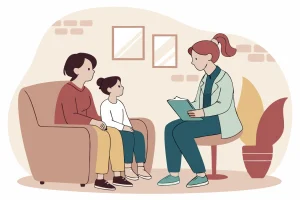[ad_1]
In today’s fast-paced world, the importance of nurturing healthy relationships within families cannot be overstated. Whether you’re navigating the tumultuous teenage years, trying to communicate better with your spouse, or seeking harmony among siblings, family dynamics can often feel overwhelming. Many parents struggle with feelings of frustration and isolation when relationships falter, yearning for a way to strengthen those bonds. Family counseling might just be the key to unlocking stronger ties and restoring harmony.
In this article, you’ll discover what family counseling is, the transformative benefits it offers your family, and practical strategies to enhance communication and connection. By the end, you’ll have a toolbox of actionable insights aimed at improving your family relationships and fostering a supportive environment. Let’s dive in and explore how family counseling can make a difference in your home!
Understanding the Basics of Family Counseling
Family counseling, often known as family therapy, is a collaborative approach aimed at improving communication and resolving conflicts within family units. This therapeutic process involves the participation of family members to address chain reactions of behavior, emotional responses, and the dynamics at play in their relationships.
At its core, family counseling is based on the idea that the family is a system, which means that the actions of one member can significantly affect the others. Counselors help families understand their patterns of behavior, promote healthy communication, and encourage empathy and understanding among members.
Why It Matters
Family counseling matters because it helps families recognize and tackle issues proactively before they escalate. By seeking guidance from a trained mental health professional, you can work together to create a healthier, more supportive home environment.
Key Benefits of Family Counseling for Parents and Children

Engaging in family counseling can have numerous positive effects not only on adult relationships but also on the emotional and psychological wellbeing of children. Here are some invaluable benefits:
-
- Improved Communication: Family counseling equips families with tools to express feelings effectively. This enhances understanding and reduces conflicts, creating space for open conversations.
-
- Stronger Relationships: Participating in therapy sessions together fosters deeper connections. Families learn to appreciate each other’s perspectives, leading to increased empathy and support.
-
- Conflict Resolution Skills: Counselors teach families how to resolve disagreements peacefully. These skills can be carried outside the therapy room and beneficially employed in daily life.
-
- Emotional Healing: Family counseling provides a safe space to confront and work through pain or trauma affecting family dynamics. Healing past wounds can foster resilience and mutual support.
-
- Adaptability and Flexibility: Families learn to adapt to change, whether due to transitions like divorce, loss, or the arrival of a new family member. Counseling enhances coping strategies to handle these shifts harmoniously.
By investing time in family counseling, you’re not only working towards immediate solutions but also equipping your family with lifelong skills.
Common Challenges with Family Counseling and How to Overcome Them
While family counseling can be incredibly beneficial, some families encounter challenges that can hinder progress. Here are a few common issues and practical solutions:
-
- Reluctance to Share: Family members might feel reluctant to discuss personal feelings in a group setting.
-
- Solution: Encourage open dialogue before sessions. Emphasize that sharing is a safe, judgment-free zone.
-
- Reluctance to Share: Family members might feel reluctant to discuss personal feelings in a group setting.
-
- Different Goals: Family members may come to therapy with conflicting expectations or desires.
-
- Solution: Start with a family meeting to establish common goals for therapy. A unified front can help align individual perspectives.
-
- Different Goals: Family members may come to therapy with conflicting expectations or desires.
-
- Defensiveness: Some may become defensive when discussing painful issues.
-
- Solution: Counselors often create structured exercises that allow members to express feelings without interruption, reducing defensiveness.
-
- Defensiveness: Some may become defensive when discussing painful issues.
-
- Time Commitment: Busy schedules may conflict with therapy sessions.
-
- Solution: Prioritize counseling as an essential family commitment. Consider shorter, more frequent sessions to accommodate everyone’s availabilities.
-
- Time Commitment: Busy schedules may conflict with therapy sessions.
By anticipating these challenges and applying these strategies, you can maximize the benefits of family counseling.
Expert-Recommended Family Counseling Strategies
Navigating family dynamics doesn’t just end with therapy sessions. Here are some actionable tips you can integrate into your family life to reinforce what you learn in counseling:
-
- Practice Active Listening: Encourage each family member to listen attentively, without interrupting. Implement a “talking stick” to signal who has the floor.
-
- Create Regular Family Meetings: Setting aside time weekly or bi-weekly for family meetings fosters open communication. Discuss schedules, issues, or successes openly with everyone.
-
- Establish Family Rituals: Regular, intentional time spent together—like family dinners or game nights—strengthens bonds and creates lasting memories.
-
- Utilize “I” Statements: When discussing feelings, use “I” statements to prevent sounding accusatory (e.g., “I feel upset when…” rather than “You always…”).
-
- Celebrate Small Wins: Acknowledge improvements in communication or family behavior. Celebrating these milestones fosters positivity and reinforces progress.
-
- Encourage Individual Counseling: Sometimes, individual issues need to be addressed separately. Encourage members who need it to seek their own support.
Integrating these strategies into your daily life can amplify the effects of family counseling, leading to lasting change and stronger relationships.
Essential Family Counseling Tips for Different Age Groups
Every age group has distinct needs and communication styles. Here are tailored suggestions to help different segments of your family thrive:
Toddlers and Preschoolers (Ages 2-5)
-
- Use Play Therapy: Engage in play-based activities that allow children to express emotions non-verbally.
-
- Keep Conversations Simple: Use age-appropriate language and simple concepts to discuss feelings.
Early Childhood (Ages 6-12)
-
- Encourage Creativity: Use art, storytelling, or role-play to allow children to express emotions and experiences.
-
- Establish Daily Routines: Consistent routines give children a sense of stability, crucial for their emotional development.
Adolescents (Ages 13-18)
-
- Promote Independence: Encourage teenagers to voice their feelings and establish boundaries in discussions.
-
- Utilize Technology: Consider using forums or apps geared toward teen engagement for discussions, easing them into vulnerable conversations.
Adults
-
- Model Healthy Communication: Show younger family members what effective conflict resolution looks like in adult interactions.
-
- Prioritize Self-Care: Ensure that you take time for your well-being, which positively influences your family dynamics.
By adapting your communication strategies as per age groups, you can support each member’s emotional growth and well-being.
Making Family Counseling Work for Your Family
Each family is unique, and a one-size-fits-all approach rarely suffices. Here are some personalized adaptation strategies to maximize family counseling for your unique needs:
-
- Identify Your Family’s Strengths: Acknowledge what works well in your family dynamics and build upon those strengths during counseling sessions.
-
- Be Open to Change: Flexibility is crucial. Be prepared to alter plans as you learn more about what is most beneficial for your family.
-
- Incorporate Fun: Make counseling sessions engaging by involving fun activities or icebreakers. It can ease tension and make discussions lighter.
-
- Create a Safe Space: Designate a comfortable environment for conversations—one where everyone feels at ease discussing their thoughts.
Making counseling a positive experience encourages everyone to engage fully, leading to greater success.
When to Seek Professional Help with Family Counseling
Recognizing the need for professional help can sometimes be daunting. Here are some warning signs that family counseling might be suitable for your situation:
-
- Recurring Conflicts: If fights become frequent and escalate, it may be time for intervention.
-
- Breakdown in Communication: If family members stop communicating altogether or only speak in anger, professional help can help restore dialogue.
-
- Withdrawal and Isolation: If a family member is emotionally withdrawing, it’s essential to address underlying issues before they worsen.
-
- Major Life Changes: Changes like divorce, loss, or new family additions often require adjustments that can be eased through family counseling.
If any of these signs resonate with you, consider reaching out to a qualified family counselor for a consultation.
Final Thoughts on Family Counseling
Family counseling can serve as a valuable tool for building stronger, healthier bonds among family members. By understanding the basics of family counseling, recognizing its benefits, and applying actionable strategies, you can cultivate a more harmonious home environment.
Remember, addressing family dynamics takes time, patience, and commitment. It’s okay to seek help—especially when you prioritize your children’s emotional well-being and aim for enduring family relationships. Take the first step today by exploring family counseling options in your area. Together, you can build a loving, supportive family where everyone thrives.
If you found this article helpful, share it with other parents, and start the conversation about how family counseling has impacted your life positively. Here’s to stronger family bonds!
[ad_2]


